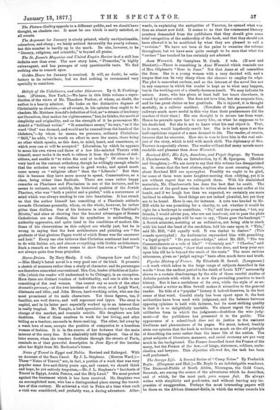Anne Warwick. By GeQrgiana M. Craik. 2 vols. (H urst
and Blackett).—There is something in Anne Warwick which reminds one of Mrs. Oliphant's " Rose in June." Not that Anne at all resembles the Rose. She is a young woman with a very decided will, and a tongue that can be very sharp when she chooses to employ its edge. The plot is somewhat curious, and as the interest of the novel lies not in any suspense in which the reader is kept as to what may happen, but in the working-out of a clearly-foreseen result. We may indicate its nature. Anne, who has given at least half her heart elsewhere, is wooed by another suitor. She does not love him, but she respects him, and he has great claims on her gratitude. He is injured, it is thought mortally, in a railway accident. (Novelists of this generation find railways much more useful in this way than their predecessors did the coaches of their time.) His one thought is to secure her from want. Hence he prevails upon her to marry him, on what he supposes to be his death-bed. But she is not to know what his real object is. That, he is sure, would hopelessly revolt her. She is to look upon it as the half-capricious request of a man doomed to die. The reader, of course, foresees that he recovers. How she is won to love him is the real sub- ject of the story, which is told with much skill. The diplomacy of Mrs. Travers is especially clever. The reader will not find many novels more readable and pleasant than Anne Warwick.






































 Previous page
Previous page